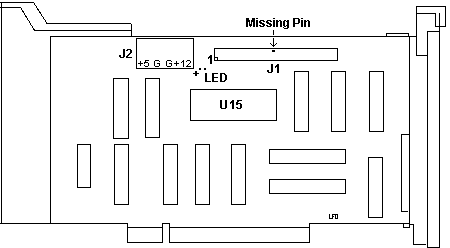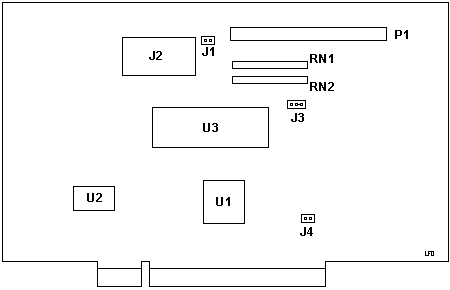|
@6263.ADF Arco AC-1070 IDE Controller supports CD-ROM (rename)
@6263.ADF Arco AC-1070 IDE Controller Different brands (i.e. CMS Enhancements)
@62B6.ADF Arco AC-1079 SLIM Drive Adapter Allows Mirroring!
ARCO.zip DOS/Win 3.x, NT3.5,OS2,Novell 286/386, adf, MCAIDE
MCDROM Install IDE CDROM with HD, or alone
ARCO BIOS 3.03 '94
Uses NS NMC27C64Q-150 8Kx8 CMOS EPROM 28-pin DIP
The 1070 is the early one piece card version, unlike the 1075, which has a
detachable slot bracket. The 1075 will fit in the Integrated Drive controller
slot on a 50/50z if you remove the single phillips screw in the upper right
corner of the adapter.
ARCO in an 8550
BIOS Capabilities
CD-ROM on 1075
IDE and SCSI
PIO Mode Only
Max Drive Size
MCIDE.EXE
ADF Sections
AC-1075 Rev C
![Front [P]](/other/img/photo.gif)

Peter said:
That version uses 4 PALs (2x GAL16V8A, 1x GAL20V8A, 1x TIBPAL
20L8), 4x 74LS245, 1x 74LS374, 3x 74LS373 and 1x 74F04 + 1x 27C64-150 EPROM
(8Kx8).
The main disadvantage on that controller is the off-standard I/O address. It
will not be detected properly as IDE controller under e.g. Windows or with any
OEM IDE driver under DOS. As far as I can tell from tracking the connections
two of the PALs are used to set the adapter ID / POS and the other two
are address decoders for the I/O range and the other decodes the ROM
address.
Adapter ID detection could be easily done with 2 x 8-bit logic comparators,
but you really don't need to do that if you'd opt for a "passive" card that
just occupies a fixed I/O range and directly hooks to IRQ 14h. That card would
be treated as a system board extension - just like a COM- or LPT-port. The only
thing you need is a boot ROM that hooks into the PS/2 ABIOS routine and settles
the first of the IDE HDs as "Hex 80" device - just like as if it were attached
to an ESDI controller for instance.
It couldn't be that complicated. The most of the routines are already
included within the IBM ABIOS. The complete handbook scans of the PS/2 BIOS are
in the PDF download section on my pages.
Guess I need to copy the ROM content from the CMS / ARCO controller into my
EPROMmer and dig a bit in it on how they did it. That controller is bootable
and there must be an easy mechanism on how they hook the drive into the
bootable devices list.
AC-1075 Rev D

J1 Two pin header
J2 Drive power connector
J3 three pin header, pins 2 and 3 shunted
J4 Outline / pads for two pin header
|
P1 IDE connector (pin 20 snipped)
U1 "ACP" PLCC
U2 F245 Logic
U3 BIOS
|
Note the much reduced chip count.
ARCO in a 8550
From Peter:
Some versions of the
ARCO IDE had been designed to substitute the "HD Riser"
card in the hidden 4th slot on the Mod. 50. You just
remove the blue tab at the card front and remove the
rear slotcover - and the card should fit in there.
IDE in an IML Machine?
Well, sort of. The IDE controller can only be
installed in a non-IML machine, such as the 8580, or a
90/95/85 with Flash BIOS. If you have a Type 1 upgrade
DX2-66 complex OR a Type 4 complex, OR a 9585 then you
can use this controller and IDE drives. I installed an
AC-1075 and hooked up a WD-AC2420 drive in my
9590-OPT...
System Partition on IDE?
Yes and no. Yes it will install a system
partition, BUT it will be a 3MB primary partition. You
can install an extended partition, but you still cannot
access the system partition the drive laid down (shades
of the IBM Fast SCSI-2). Of course, the AC1075 does not
use the Int4b interface required by IML systems...
Start Up Sequence
Make sure you select A: then Hard Drive 0
in startup sequence if you want to boot from the IDE
drive. If you have a SCSI controller, you can have a
SCSI drive selected as the boot device.
AC-1075 with IBM SCSI Adapters under W95
Although the startup sequence functions just fine
selecting either the IDE drive or the SCSI drive for a
start up device, W95 bombs when you try to look at
hardware performance. There is no provision in the ARCO
adf to change the AC-1070's IRQ from 14. And everyone
knows that the IBM SCSI adapters only have IRQ 14
support. Though the two IO ranges are separate (ARCO in
the 200s, IBM in the 300s) W95 can't handle the shared
IRQs.
W95 and the AC-1070
From a snippet- (Looks as if Win95 does not
recognize the ARCO as valid IDE controller ... control
panel does not even show the HD).
More to come. I must get my 9590 back up to install W95
on an IDE drive....
BIOS Capabilities
Version E (BIOS EPROM ver 3.03) supports
2Gb hard disk on PS/2 70; but version C (BIOS EPROM ver.
3.00) only supports 540 meg (525 Mb) hard disk in the
same system.
CD-ROM Drives on ARCO 1070
William Walsh was cracking the whip down at Farmwagon.com,
and came up with: Note:
The wildman did not have the ARCO CD-ROM drivers!
Decided to try my ATAPI CD-ROMs with the ARCO
1070 controller. According to the startup screen, the
controller has ROM Version 3.05. I was doing this in a
Model 50Z PS/2. I also tried all of this in a 9577
Bermuda, an 8557slc, and a Model 8570-E61.
The first thing I learned from trying this is that
there must be a hard disk attached to the adapter as
well. I couldn't seem to get it to find any of my CD-ROM
drives without a hard disk attached. The ADF and Set
Configuration screens kind of hint at this...you are
allowed to pick a type of IDE device for the slave
device only. There is no similar option for the master
device.
Next thing I learned is that you have to use an
external power supply for any CD-ROM drive above 6X with
your Model 50. (The 70 PSU seemed to handle things OK.)
The 50Z PSU simply couldn't stand the 8X and higher
drives, even with no other adapters in the machine. I
sort of expected this, seeing as it is a small supply.
The ARCO adapter also seems to be picky about what kind
of CD-ROM drives it will accept. I had no problems with
all of my 4X or 6X drives (all NEC units, and one
Torisan), and of the one 24X drive (Toshiba) I tried, it
was found by the adapter as well. I did not have the
same luck with any of my 8X Hitachi drives. Those drives
(8X Hitachi) resulted in system lockups and hard disk
(10xxx) errors during POST.
Anyway, once I had a CD-ROM drive installed and
recognized by the adapter, I tried loading DOS device
drivers for the CD-ROM drive. The first driver I tried
(a seemingly universal one) just locked the machine
whenever it loaded. No text, no errors, nothing at all.
Just a lockup. I tried other drives with that, and when
I was finally satisfied that it was not the drives, I
tried another universal IDE CD-ROM device driver. It
loaded, but found no drives, no matter what.
It seems that the unusual I/O addresses of the ARCO
adapter throw the CD-ROM device drivers that I tried for
a loop.
Summary: In theory, it seems that BIOS revision 3.05 of
the ARCO card will support certain CD-ROM drives, but
that the device drivers I tried to use to make these
CD-ROM drives work either locked the computer or could
find no CD-ROM drives.
It looks as though if someone wanted to
use this adapter for a CD-ROM drive, they would have to
write their own device drivers for it...it's a shame
that I don't know how to do that...I would if I could...
PIO Mode Only?
Note: From the
User's manual: "... the ARCO BIOS allows the AC-1070/75
to run at I/O addresses 2510h or 2520h as well as
respond to interrupt 14".
>The .ADF for the ARCO makes NO reference to
the IRQ used (if any). Now this could mean that it's
hard-wired to IRQ14 (as is the onboard ESDI), or that it
is I/O polled.
From Peter:
It seems to be used in PIO mode. If it were
using any IRQ it should have the INT mentioned under
"fixedressources" as have the IBM MCA SCSI controllers
like in the below example:
fixedresources
pos[2]=1X1000XXb
pos[1]=XXXXXXXXb
pos[0]=XXXXXXXXb
int 0eh
The ARCO also uses 16 I/O addresses on
2510h to 251Fh (alternatively: 2520h - 252Fh), which is
pretty unfamiliar. Usually the IDE adapters uses 8 I/O
ports in the 1F0h - 1F7h (170h - 177h secondary) as
data-port and 3F6h (376h secondary) as control-/ status
port. And IRQ 0Eh (0Fh) as interrupt.
So the ARCO is anything but not a
standard IDE-controller anyway. I think it is best
used under DOS/Win3.x or (probably) OS/2 ... not
recommended for Win95 / 98 / NT - as usual.
The ROM-BIOS -by the way- can be set to
disabled in the Setup.
Max Drive Size
The ARCO may not see the 2.5 (doubtful) It
does have an EIDE limit of 2.1GB accordingly and
also supports internal EIDE CD-ROMs (for 5.25" bay
units). But it has its own Drive table settings on
the card. Most likely when you preformatted the
drive on a different computer the CYLS/HDS/S-T are
different than what the BIOS on the card is going to
see.
The AC-1070 controller's adapter BIOS supports
IDE drives up to 2 GB. If a drive was partitioned
and formatted to a higher capacity, the controller will
not permit the drive to operate under that partitioning
scheme.
My question - will it allow multiple 2.1 GB partitions?
ATAPI CDROM Support
The @6263.adf, dated 07/02/95 has a section for CD-ROM support.
MCIDE.EXE
MCIDE.EXE shows you the configuration of
any hard drive attached to an ARCO MCA hard drive
adapter. The program displays the drive
information provided by the hard disk manufacturer, so
it may not always be accurate. MCIDE.EXE will also
display the ARCO adapter information.
IDE and SCSI
From Tim Clarke:
Before this gets too out of hand - the rules
for mixing an IDE/ESDI adapter with SCSI adapter(s) *for
the Model 80* (and probably all others) are as follows:
- you may only install one IDE or ESDI adapter
- IDE/ESDI adapter's BIOS ROM *must* be configured with a
lower address than that of the SCSI adapter(s)
This is because the IDE/ESDI BIOS ROM code
isn't intelligent enough to "add" the drives that it
supports after any drives which may have already been
installed by another BIOS ROM (e.g. multiple SCSI
adapters with multiple HDs each). It assumes that the
drive(s) that it supports will always be Drive 0 (BIOS
Drive 0x80) and Drive 1 (BIOS Drive 0x81). The IBM SCSI
adapters' BIOS ROM is designed to "add" it's drives to a
system which already has one or more HDs already
"installed" and utilizes the XBDA (eXtended BIOS Data
Area) to chain Int 13h, Int 4Bh (IBM SCSI) and note
"first" and "count" values for each SCSI adapter.
Supposed Specs
Transfer rates in excess of 1200Kbps
On board BIOS for intelligent interface
Automatic Drive Recognition (ADR) recognizes / supports
all IDE drives
AdapterID 6263
ARCO Computer Products, Inc (IDE Adapter)
Adapter Memory Location
Select the ROM segment for the ARCO IDE
adapter
<"Segment
DC00" (dc00-dfff)>, D800 (d800-dbff), D400
(d400-d7ff), D000 (d000-d3ff), CC00 (cc00-cfff), C800
(c800-cbff), ROM DISABLE
IO Address
The Adapter I/O address location is:
<"2510-251F"(2510-251f)>,
2520-252F (2520-252f)
Slave Drive is
Supports ATAPI device (CDROM) that is a
slave drive
<"ATA
Device">, ATAPI Device, Not Installed
|